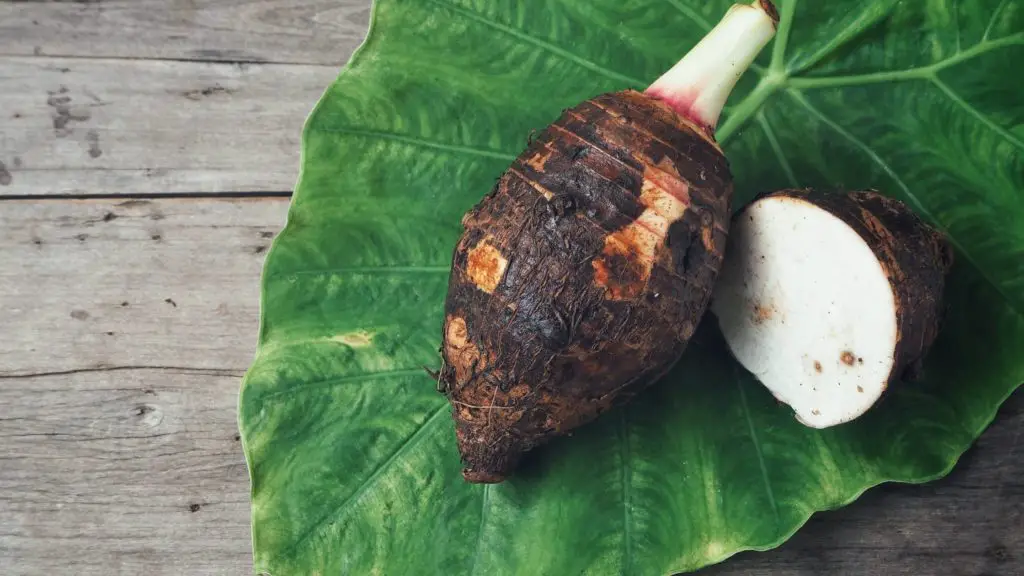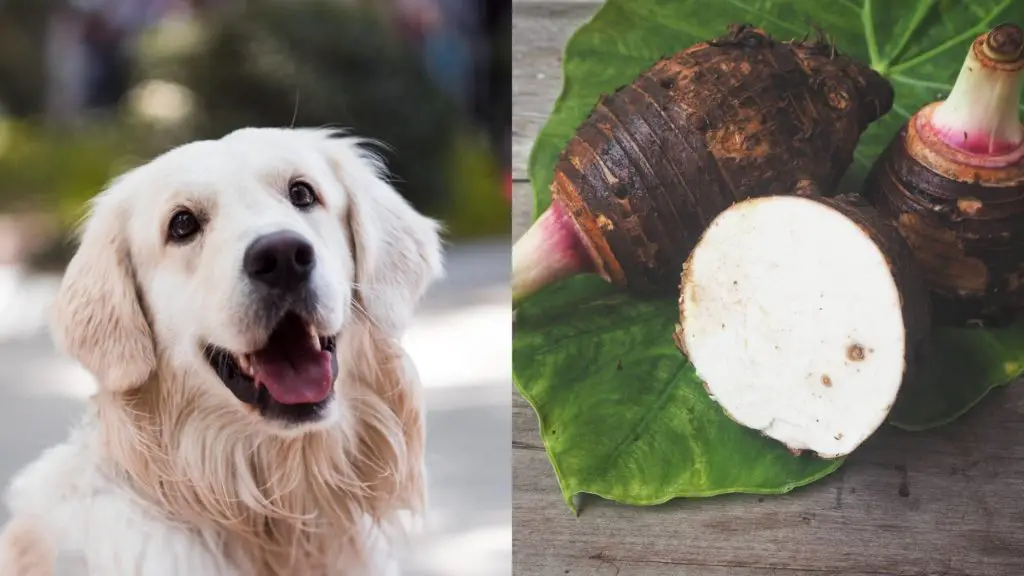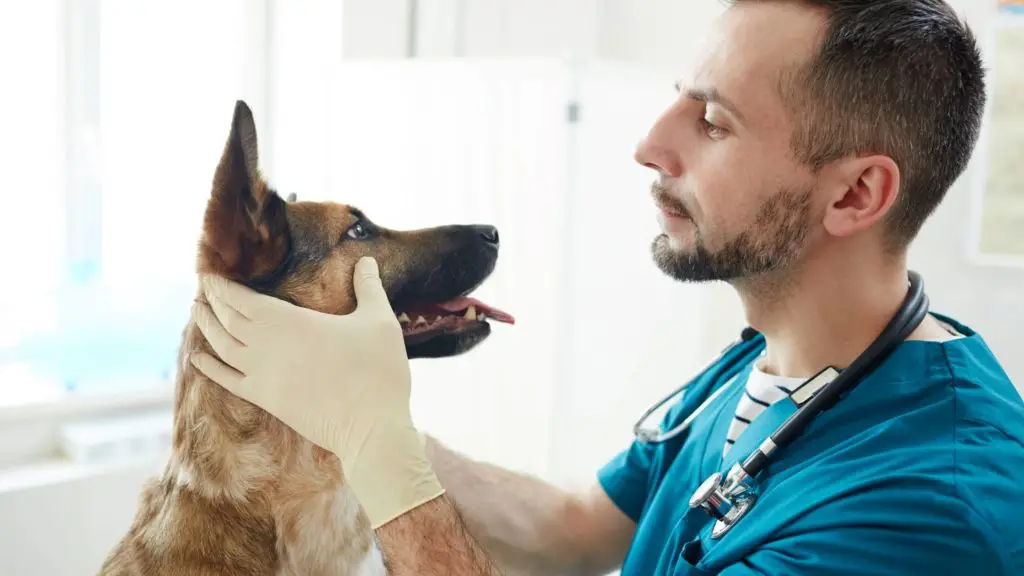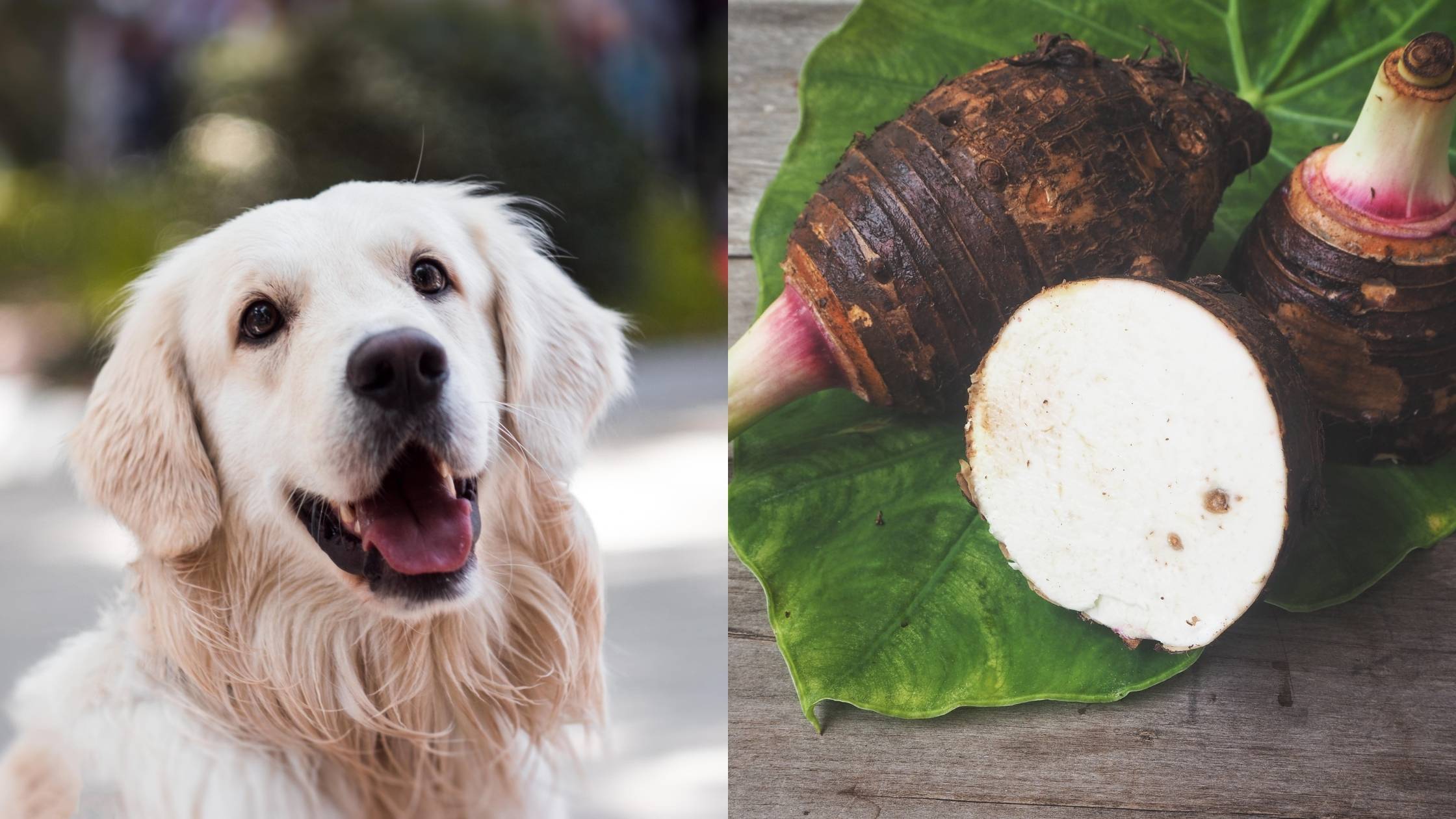Last Updated on 11/17/2021 by Veronica Jones
Also known as the potato of the tropics, taro originated in Asia and is now enjoyed in dishes all over the world.
Cooked taro root is a good source of fiber, carbohydrates and vitamins for humans, but can dogs eat taro root too?
Don’t serve your pup taro or poi without reading this article first.
What is taro?
Taro is a root vegetable with brown skin, white flesh and purple specks. When cooked, the taro has a similar texture to a potato with a mild sweet taste. Taro is also packed full of potassium, vitamin C, vitamin A and iron.
Cooked taro root can be added to soups or stews, used to make poi mash or sliced and baled for taro chips.

Can dogs eat taro?
Is taro safe for dogs? No, taro is considered toxic to dogs and should not be consumed in any form, including raw taro roots, cooked taro or taro ice cream. The taro plant contains a poisonous chemical, a version of calcium oxalates, which can cause taro poisoning if consumed by cats or dogs.
Taro also contains clumps of minerals and other substances that can form in a dog’s kidneys and cause kidney stones.
Raw taro is can even be poisonous to humans because of the presence of calcium oxalate. Whilst cooking reduces the risk of toxicity for people, the same is not the case for dogs or cats. Pets should not eat any part of the taro plant, including taro leaves whether they are raw or cooked.

What about taro ice cream?
Taro ice cream is made from taro root so should not be given to canines as it is highly toxic. Any food that contains taro should not be given to dogs.
Can puppies eat taro?
In short, definitely not. As taro is not safe for fully grown dogs, it’s not safe for puppies either. The effects of taro poisoning on a pup’s growing body could end up being even more serious.
What happens if my dog eats taro root and taro plant?
Eating taro can cause serious illness and even death in dogs. How your dog is affected will depend on the amount consumed and the size of your pup. Dogs weighing less than bigger dogs may experience the symptoms more severely. If your pet consumes a small amount of taro, he will probably experience sickness.
Taro plants contain insoluble calcium oxalate crystals which are also found in plants from the Araceae family, all of which are highly toxic to pets.

Symptoms of taro poisoning in dogs
The most commonly reported signs of taro poisoning include:
• Eye irritation
• Inflamed or burning skin
• Diarrhea
• Vomiting
• Pawing at the face and mouth
• Excessive thirst and urination
• Loss of appetite
• Swollen tongue and mouth
• Difficulty breathing
• A lack of urination
• Confusion
In rare cases, taro poisoning can be fatal if a significant amount of taro has been ingested.
Diagnosis and treatment of taro poisoning in dogs
Your vet will need to conduct a physical examination of your dog to check pulse, blood pressure, reflexes and temperature. Some laboratory tests may also need to be done to diagnose taro poisoning. An endoscopy or x-rays may also be conducted to check that there are no obstructions or inflammation in your dog’s body.
Taro poisoning will be treated depending on your pet’s symptoms and how much taro has been consumed. It’s likely that your dog will be hospitalized for several hours to be observed. Treatment options may include:
Induced vomiting – ipecac or peroxide will be given to your dog to make him vomit. Induced vomiting should only ever be carried out by a vet, never at home. Activated charcoal may be given to help absorb undigested toxins.
Detoxing – to help rehydrate your pup and flush out the kidneys, fluids may be given via an IV line.
Medication – electrolytes, corticosteroids and antacids may be given.
What to do if your dog ate taro root?
Taro poisoning requires urgent medical attention. If you think that your dog has consumed taro or is showing any of the symptoms listed above, you should contact your veterinarian immediately.
Stay calm and remove any remaining taro root away from your dog so he can’t eat anymore. Don’t get tempted to try and induce vomiting as this can cause more harm to your pooch. Stay with your four-legged friend and monitor him while you speak to the vet, who can give you more advice on how you can help your dog.

Dog-friendly alternatives to cooked taro root for dogs
The right kind of vegetable can be a great addition to your dog’s diet if fed correctly and in small amounts. Root vegetables such as carrots, sweet potatoes, beets and parsnips are safe to give your pup as part of a balanced pup diet.
Dog-safe vegetables contain a range of vitamins and minerals and can help keep your pooch hydrated. When introducing any new food to your dog, you should contact your vet for advice first.
Taro and dogs
Although cooked taro is a delicious and nutritious root vegetable for humans to eat, it’s highly toxic to canines and should be kept well out of reach to prevent taro poisoning.
Keep raw and cooked taro root in a locked cupboard and out of reach of your pup’s mouth or paws to avoid taro poisoning, mouth or gastrointestinal irritation and possible kidney damage. There are plenty of other dog-safe foods that you can give your pet that won’t carry the risk of poisoning.
Looking for More Great Articles About What Your Dog Can (or Can’t) Eat?
- Can Dogs Eat Coleslaw? What are the Risks?
- Can Dogs Drink Soda? And what about Coke?
- Can Dogs Eat Mulberries? Are they Safe for Dogs?
- Can Dogs Eat Prosciutto? Everything You Need to Know
Reference list
- PDSA “safe fruits for dogs” https://www.pdsa.org.uk/pet-help-and-advice/looking-after-your-pet/puppies-dogs/safe-fruit-and-veg-for-dogs Accessed 17th October 2021
- VCA Hospitals “bladder stones in dogs” https://vcahospitals.com/know-your-pet/bladder-stones-in-dogs Accessed 17th October 2021
- ASPCA “toxic plants for dogs” https://www.aspca.org/pet-care/animal-poison-control/toxic-and-non-toxic-plants/taro-0 Accessed 17th October 2021
- ASPCA “safe plants for dogs” https://www.aspca.org/pet-care/animal-poison-control/dogs-plant-list Accessed 17th October 2021

